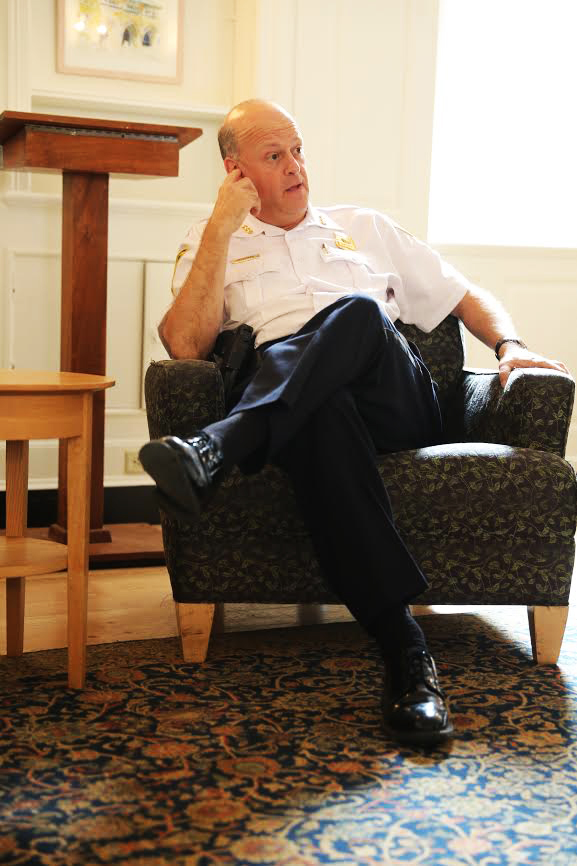In the Davenport Common Room Thursday night, New Haven Chief of Police Dean Esserman and community activist Barbara Fair laid out starkly different takes on the state of policing in the Elm City.
At the talk, hosted by the Yale Undergraduate Prison Project, Esserman and Fair debated policing tactics used across New Haven, culminating the conversation in a discussion of race relations across America.
Dwight Hall Co-Coordinator Sterling Johnson ’15 moderated the conversation, which covered crime in New Haven, police brutality, community policing and a community outreach program called Project Longevity. During the dialogue, members of the New Haven community spoke out about their experiences. By the conclusion of the conversation, race tensions had emerged as a major theme.
“How can you have community policing, which is about protecting and serving, and yet we’re overpowered by police who are all but looking at people in the community like they’re suspects,” Fair said.
Esserman began the dialogue by defending the New Haven Police Department’s community policing efforts and their role in stemming crime in the city.
In particular, he stressed the importance of creating a relationship between the police and the community.
“You call who you know,” Esserman said. “Rebuilding the trust is really the philosophy of community policing.”
Though Esserman stressed that the NHPD was working to build a relationship between the officers and the community, both Fair and other members of the audience were visibly unconvinced. Some audience members went as far as to scoff at Esserman.
Fair said that the war on drugs puts a significant wedge between the police and the community. The idea of community policing, she added, and the war on drugs are inherently in opposition.
Fair also stressed that her biggest fear for her sons was not being shot by one of their peers, but rather by a white police officer.
While Esserman and Fair presented differing views on many topics throughout the talk, tensions rose when an audience member, Fair’s son, spoke out about his very negative experiences with NHPD.
Nearly in tears, Fair’s son told Esserman that, although he no longer lives in the community, he believes there is still a strained relationship between community residents and police officers. He said he was once wrongfully convicted, and this mark on his record has affected the way police have treated him subsequently.
“We [New Haven youth] are angry and we have got no one but the person next to us to take it out on,” he said, when talking about violence among young black men.
Fair’s daughter also said that she has had very negative interactions with police officers in the city. She referenced a confrontation with a police officer earlier this week.
“I have no record, and I don’t disrespect people,” she said. “I felt disrespected to the utmost.”
All three members of the Fair family acknowledged that some police officers in the area are loved and respectful, but they said many are not.
Esserman and Fair’s disagreements extended to Project Longevity, a community and law enforcement initiative that aims to bring groups of community residents together with police department officials in a discussion about ways to end violence in that area. These meetings often are directed toward gang members.
Esserman said that, through this program, the Police Department underscores the notion of “group accountability.”
Fair, though, said she believes the program does not support young people in the community, but rather serves as a scare tactic.
“You can’t scare somebody that doesn’t have any hope,” Fair said.
In response to Fair’s objections, Esserman stressed that the project was still a work in progress.
He added that this project seeks to build connections between police officers and gang members to curb gang violence. He went on to acknowledge that not all gang members are violent, and some are even afraid of their violent peers.
Many students interviewed said that they believe this dialogue was crucial to see what is going on outside of the Yale bubble.
Maria Servalli ’16, the event’s director for the YUPP, said it was beneficial for students to hear what’s happening in the community around campus.
“Students got a good window into the real dynamic between the police department and the community,” said Johnson. He added that he has been stopped on the street many times because of his race and suggested that this leads to “a culture of frustration.”
State Senator Gary Holder-Winfield, who represents district 10 in Connecticut, said that the flow of the discussion itself exemplified the problem, adding that many individuals talked past one another.
YUPP runs several mentoring and tutoring initiatives through nearby correctional facilities.








